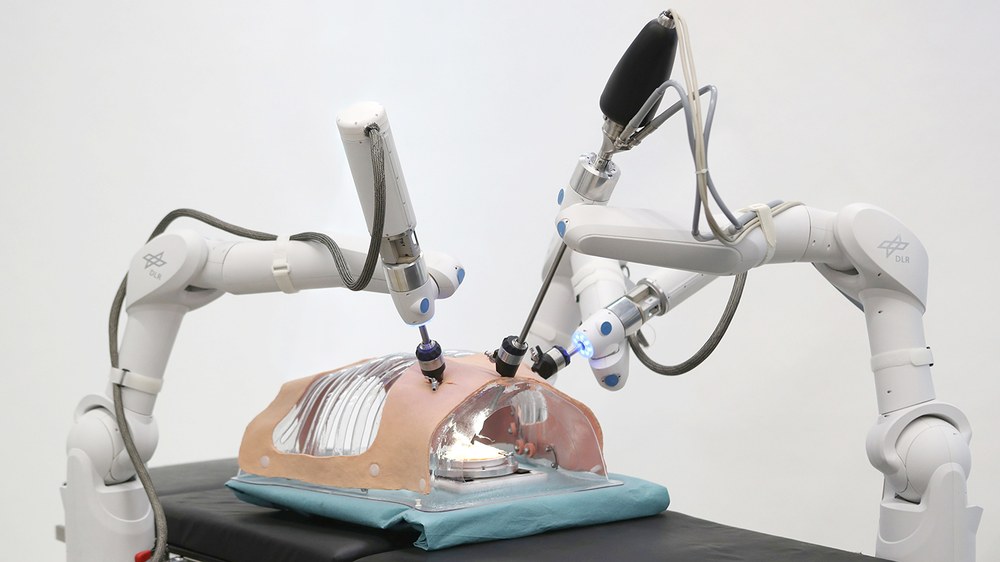DIH-HERO: A network for medical robotics
Closer exchanges between academia and especially small and medium-sized businesses, a faster route from innovation to market research, and mutual support: these are the goals of the Digital Innovation Hub for Healthcare Robotics (DIH-HERO). The independent platform, which is made available to interested parties to network in the fields of healthcare and medical technology, was presented in March 2019 at the European Robotics Forum in Bucharest. The European Union is funding the project with 16 million euros. The Institute of Robotics and Mechatronics of the German Aerospace Center (DLR) is one of the consortium’s 17 partners with its Miro Innovation Lab and the SMile (service robotics for people with disabilities and people in need of care) and VITA (Virtual Therapy Arm) projects.
“The DIH-HERO network will make an important contribution to innovations in healthcare robotics,” says Professor Albu-Schäffer, head of the DLR Institute of Robotics and Mechatronics. “The entire value chain will benefit from the networking of participants. Innovative products and services can be brought to market faster and more efficiently, to the great advantage of European society. In addition, DLR can draw on sophisticated high-tech robotic technology in the healthcare sector, which was originally developed and verified for the use of astronauts in space.” Companies, research institutions, hospitals, nursing homes, investors and end-users all over Europe can connect through an online portal that has been set up in various stages since March 2019 where they can access know-how in healthcare robotics. Small and medium-sized companies in particular can look for partners, find funding opportunities and inform themselves about international standards. It also collects and prepares information about best practices or innovations that are shared within the network.
Support for technology transfer
17 consortium partners from eleven different European regions are involved in DIH-HERO. In addition to the DLR, the Fraunhofer IPA and the Aachen University Hospital are German participants. The project is coordinated by the University of Twente in the Netherlands. Various, sometimes local events are held to find additional partners for the network, who in turn provide expertise or services. A budget of eight million euros, which will be made available to small and medium-sized enterprises, is of particular interest. In five tenders, small and medium-sized enterprises (SMEs) can apply for funding.
The first call, which is expected to start in mid-2019, will offer travel vouchers for SMEs to a major brokerage event in the fall. The later tenders will focus on technology and innovation. In two tenders, SMEs can apply for funding of €100,000 each with projects lasting no more than nine months. The aim here is to demonstrate the feasibility of innovative technologies in robotics and to apply them in the healthcare sector. In the most elaborate and final call for proposals, technology transfer will be supported: a total of 20 projects with a maximum duration of 15 months will receive funding of €200,000 each. In addition, the partners of the network offer coaching for all projects.
The project should be sustainable and facilitate future cooperation. “DLR can provide valuable support to small and medium-sized companies with its expertise,” explains institute director Professor Alin Albu-Schäffer. “And in turn, we benefit from getting to know companies’ needs at an early stage so we can accelerate technology transfer to the market.”
Medical robotics and assistive systems at DLR
DLR already has a wide range of projects in medical robotics. MiroSurge is the development of a modular tele-surgical system for minimally invasive medical procedures in which three robotic arms support the surgeon. Both the video stream of the endoscope and the measured forces can be displayed at the surgeon’s console. The surgeon not only can see what is happening, but also feel it due to force feedback on the input devices. Another project of the DLR Institute of Robotics and Mechatronics is the mobile robot EDAN (EMG-controlled daily assistant), an assistance robotics system for people with severe motor impairments. The robot is controlled by means of muscle signals. For example, the system assists patients with muscular atrophy in everyday tasks such as drinking from a glass. Medical robotics can also contribute know-how in rehabilitation: In the VITA research project, DLR works with a virtual rehabilitation environment in which persons with impairments in the upper limbs (for example due to amputation or stroke) can perform exercises. Using muscle signals, users can fully reuse their limbs in virtual reality. This can reduce phantom pain in the patient. Intentional motion detection is based on a sophisticated machine learning system.
Interested companies, organizations or research facilities can get more information or apply as partners at www.dih-hero.eu.

